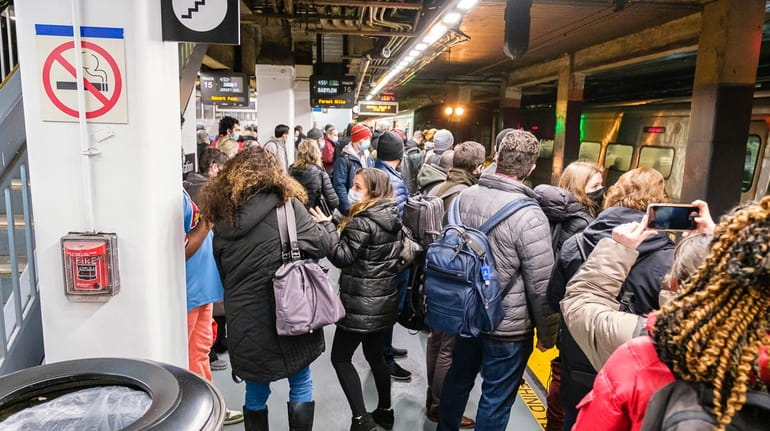Dissatisfied customers? LIRR commuters say conditions at Penn 'worse than ever'

Several riders responding to a survey said conditions at Penn Station have reached an all-time low. Credit: Jeff Bachner
Encountering people at train stations who are panhandling or homeless is the top concern among dissatisfied Long Island Rail Road customers, a new survey reveals.
Respondents in the LIRR’s latest customer satisfaction survey, released two weeks ago, cited "the number of people panhandling, experiencing mental illness or homelessness at destination station" as the primary reason for feeling the rail service does not meet expectations.
What to know
The results of the Long Island Rail Road’s most recent customer satisfaction survey showed that the No. 1 concern among dissatisfied customers was the prevalence of panhandlers, homeless people and those with mental illness at stations.
The MTA, which has said it’s limited in its ability to address the issue, said social service agencies in New York City and Long Island are responsible for addressing chronic homelessness and should do so “in a humane and effective manner.”
Other concerns frequently cited were the cost of a ticket, issues with the LIRR’s face mask policy, and the infrequency of train service during the pandemic. On-time performance, the availability of seats, and cleanliness of stations were cited by customers satisfied with railroad service.
The railroad conducted the online survey between Sept. 20 and Oct. 4. Of the 22,000 respondents, 4,800 identified as "lapsed customers" who rode the LIRR regularly before the COVID-19 pandemic, and 17,000 said they still used the railroad.
Several riders said conditions at Penn Station have reached an all-time low — because of the pandemic, extensive construction work, and ineffective policing and homeless outreach strategies. Those combined have created unpleasant and, often, unsafe conditions, according to the survey.
LIRR commuter Tom Killeen, of Stony Brook, took the survey, and echoed the sentiments of several other riders: that conditions in Penn Station are "worse than ever."
"You can barely get off the trains without seeing somebody that’s in need and/or somebody that’s panhandling," said Killeen, who believes the problem requires more than just the attention of the LIRR or police to address.
"A lot of these people aren’t bad people. They’re just stuck in their world, and they can’t get out of it without our help," Killeen said.
The Metropolitan Transportation Authority — the LIRR’s parent organization — has said it’s taken several measures to address quality-of-life concerns at Penn, including by cordoning off some parts of the station during overnight hours, and assigning police officers to areas known for illicit activity. The MTA also works with an outside homeless outreach contractor to help provide services to individuals who want it.
Because Penn is a public space, MTA officials have said they are limited in their ability to address the issue.
MTA spokesman David Steckel, in a statement, said it is "imperative that New York City and suburban agencies responsible for providing assistance and shelter for this vulnerable population address chronic homelessness in a humane and effective manner."
A spokesperson for the New York City Department of Homeless Services did not respond to a request for comment.
"As we’ve said repeatedly, we want to make sure riders feel comfortable using the transit system, and we will continue to work with the social services departments in the City, as well as Nassau and Suffolk counties, and their respective police departments to address this issue," Steckel said.
State Sen. Phil Boyle (R-Bay Shore) said concerns about homeless people at train stations exist on Long Island, too. Boyle has been pushing the railroad for years to address complaints about aggressive panhandling at the Babylon station. Despite MTA Police committing to increasing patrols at the station, Boyle said the problem has gotten worse.
"I am shocked that this issue has risen to the highest level of people’s concerns on the Long Island Rail Road," said Boyle, who wants the railroad’s homeless outreach providers to do a better job reaching stations throughout the Island. Those who refuse help "have to be removed from train stations."
"At the end of the day, we cannot have people camping at stations where commuters frequent and students are nearby," Boyle said.
MTA Police Chief Joseph McGrann acknowledged in a November meeting that Babylon has been "a little bit of a thorn in our side," and said a methadone clinic near the station has contributed to the problem.
Overall, the results of the survey reflected the changing face of commuting in the COVID-19 era. Other concerns frequently cited by dissatisfied customers were the cost of a ticket, issues with the LIRR’s face mask policy, and the infrequency of train service during the pandemic. The railroad has been operating on a reduced schedule since March 2020, when the pandemic caused ridership to plunge.
On issues where the LIRR struggled before the pandemic, the railroad got some of its highest marks. On-time performance, the availability of seats, and cleanliness were among the top attributes cited by customers satisfied with railroad service.
"Cleanliness is now much higher on the priority list," said Gerard Bringmann, chairman of the LIRR Commuter Council, an advocacy group. "In the past, it was cleanliness just for the sake of having a nice, clean train. Now it’s cleanliness, actually, for the customers’ health and well-being."
Gilgo Manorville search ... Southold hotel pause ... Home sales ... What's up on Long Island
Gilgo Manorville search ... Southold hotel pause ... Home sales ... What's up on Long Island

